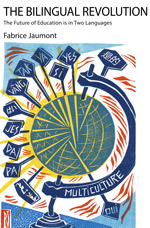 “The Bilingual Revolution,” by Fabrice Jaumont
“The Bilingual Revolution,” by Fabrice Jaumont
(TBR Books, pp 210, $19.99)
This book is about education and the teaching of foreign language in the American school system . . . And this book is about community and the use of other languages within a specific social framework . . . This book is also about cultures, ancestries, foreign roots, identities, and above all how they manifest through other languages. You could leave a blank space and fill it with your own input, and chances is that it would be coherent. Because, at heart, this book is a love-letter to the preservation of linguistic diversity.
Its arrival could not be more timely. A disruptive force in this age of nativist revivalism, where pluralistic criteria are perceived as threats to uniformity and stability of a nation. Jaumont, a specialist in these linguistic issues, has crafted a remarkable history of bilingual and dual education, which runs counter to this ideology. This is what he calls the bilingual revolution. He seeks to debunk the monolingual myth.
But the book’s true revolutionary spirit, which he clearly captures, reveals that like all revolutions, this one started as grassroots movements, scattered around the nation, with little connections with each other. Far from being led by radical and heated spirits, these groups were led by mothers and fathers, with no legal and educational expertise, but with simply the eagerness to transmit their native tongue to their children. The revolution is that over the last 5-7 years, these groups have mushroomed all over big cities and are transforming education in a global way. Jaumont shows how these groups succeeded in establishing dual language programs in their community. He covers a wide range of languages: Chinese, Russian, French, Japanese, Polish, and so on, to show how these parents did it. The real nugget of this book lies precisely on this latest remark. For anyone wishing to give their children a bilingual education, this book is a must-read. It is above all a roadmap to navigate your way through the educational school mazes and their treacherous administrative hurdles. His message is loud and clear, whether you speak Chinese or Serbian, you too can implement new programs, and he has the merit to tell you how to do it. Merci mille fois!
